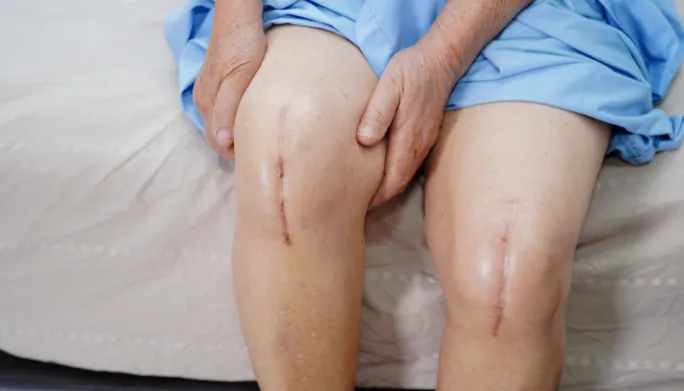Knee Replacement Surgery in Orlando
What is Knee Replacement?
Knee replacement surgery is a medical procedure that helps people who have severe knee pain and limited mobility due to damaged knee joints. During this surgery, a doctor replaces the damaged parts of the knee with artificial components made of metal and plastic. This new joint helps restore function and reduce pain, allowing individuals to enjoy an active lifestyle once again.

Who Might Need Knee Replacement?
Knee replacement surgery is usually considered when:
- Severe Pain: The knee pain is severe and doesn’t improve with other treatments like medications or physical therapy.
- Limited Mobility: The knee joint’s damage affects a person’s ability to walk, climb stairs, or perform daily activities.
- Chronic Knee Conditions: Conditions like osteoarthritis, rheumatoid arthritis, or post-traumatic arthritis have damaged the knee joint.
How do you know if you need Knee Replacement?
Here are some common signs and symptoms that may indicate the need for knee replacement:
Persistent Pain: Constant and severe knee pain, even at rest, can be a sign.
Swelling and Inflammation: Frequent knee swelling that doesn’t respond well to treatment.
Limited Range of Motion: Difficulty bending or straightening the knee fully.
Stiffness: Feeling that the knee is stiff, making it hard to move.
Instability: A sense of the knee giving way or feeling unstable during activities.
What Causes the Need for Knee Replacement?
Knee replacement is typically needed when the knee joint is damaged due to various factors:
- Osteoarthritis
Osteoarthritis is the most common cause of knee replacement. It occurs when the cartilage that cushions the knee joint wears away over time, leading to pain and stiffness.
- Rheumatoid Arthritis
Rheumatoid arthritis is an autoimmune disease that can damage the knee joint’s lining, causing inflammation and pain.
- Post-Traumatic Arthritis
This type of arthritis can develop after a severe knee injury, like a fracture or ligament tear.
- Other Conditions
Other conditions, such as gout or bone dysplasia, can also lead to knee joint damage.
How is Knee Replacement Surgery Done?
- Preparation
Before surgery, your doctor will review your medical history and perform a physical exam. They may also order X-rays or other imaging tests to assess the extent of damage.
- Anesthesia
During the surgery, you’ll receive anesthesia to ensure you don’t feel pain. There are two main types: general anesthesia (puts you to sleep) and regional anesthesia (numbs only the lower body).
- Surgery
The surgeon makes an incision over the knee and removes the damaged joint components.
Artificial components made of metal and plastic are then secured in place. These components recreate the joint’s natural shape and function.
- Closing the Incision
After the artificial components are in place, the surgeon closes the incision with stitches or staples.
- Recovery
After surgery, you’ll spend time in the hospital for monitoring and physical therapy. This helps you regain strength and mobility.
What to Expect After Knee Replacement
Recovery after knee replacement surgery takes time and effort. Here’s what you can expect:
Hospital Stay: You may spend a few days in the hospital, followed by outpatient physical therapy.
Physical Therapy: Physical therapists will help you regain strength, flexibility, and mobility.
Medications: Pain medications and antibiotics may be prescribed to manage pain and prevent infection.
Follow-Up Appointments: Regular check-ups with your surgeon will monitor your progress.
Pros and Cons of Knee Replacement
Pros:
Pain Relief: Knee replacement can significantly reduce or eliminate chronic pain.
Improved Mobility: Most people regain the ability to walk, climb stairs, and engage in daily activities.
Better Quality of Life: Knee replacement can improve overall quality of life, allowing for a more active and pain-free lifestyle.
Risks:
Infection: Like any surgery, there’s a risk of infection, although it’s relatively low.
Blood Clots: Blood clots can occur, so medications and compression stockings may be used to reduce this risk.
Implant Problems: Artificial knee components can wear out over time, requiring additional surgery.
Looking for Knee Replacement Surgery?
In conclusion, knee replacement surgery is a medical procedure designed to relieve pain and restore function for individuals suffering from severe knee joint damage. While it’s a significant step, it can provide immense relief and improve the quality of life for those who need it.
If you or someone you know is considering knee replacement surgery, it’s crucial to consult with a healthcare professional to discuss the risks, benefits, and expected outcomes. Your healthcare team will guide youhrough the process and help you achieve a successful recovery, ensuring you can enjoy an active and pain-free life once again!
Request An Appointment
Please fill out this form and
we will contact you about scheduling.


